| Srl | Item |
| 1 |
ID:
173186
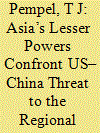

|
|
|
|
|
| Summary/Abstract |
Tensions between the United States and China have been on the rise under Xi Jinping and Donald Trump, challenging longstanding regional moves to peace and prosperity. In response, a number of less powerful East Asian states have taken steps toward deeper regional economic ties and multilateral institutions. This paper analyzes these competing tensions and their implications for the Asia-Pacific regional order.
|
|
|
|
|
|
|
|
|
|
|
|
|
|
|
|
| 2 |
ID:
146483
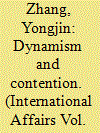

|
|
|
| 3 |
ID:
131423
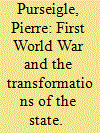

|
|
|
|
|
| Publication |
2014.
|
| Summary/Abstract |
Scholars of the First World War have long recognized the critical role played by the state in leading, organizing and managing the mobilization of belligerent societies, and the state's transformations have testified to the impact of industrialized warfare. Since the late 1980s, however, the cultural turn that largely accounts for the renewal and dynamism of First World War studies has shifted the emphasis away from the wartime state and its operations. Its study relatively suffered as a result. This article aims to bring the state back into the centre of the historiographical discussion, since its transformations testified to the nature and political impact of industrialized warfare. The article therefore focuses on three critical aspects of the relationship between state and society: the deployment of coercion, the expression of national solidarity and the redefinition of sovereignty. It demonstrates how the logic of mass participation in modern warfare transformed both the contours and the foundations of the state. To do so, the article draws on a renewed engagement with social scientific literature and the sociology of the state in particular.
|
|
|
|
|
|
|
|
|
|
|
|
|
|
|
|
| 4 |
ID:
092324
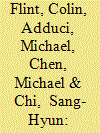

|
|
|
|
|
| Publication |
2009.
|
| Summary/Abstract |
The changing geographical foci of the geopolitical code of the United States are examined by a content analysis of the presidential State of the Union Speeches between 1988 and 2008, the last year of President Reagan's term through the presidency of George W. Bush. The State of the Union speeches are interpreted as geopolitical discourse within a structural setting, using seven foreign-policy paradigms as an organising framework. The empirical findings illustrate an increase over time in the number of regions and countries mentioned in the speeches. Also, notable differences between administrations in terms of their advocacy of globalist or regionalist policies and emphasis upon allies or adversaries are found.
|
|
|
|
|
|
|
|
|
|
|
|
|
|
|
|
| 5 |
ID:
123615
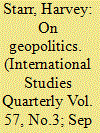

|
|
|
|
|
| Publication |
2013.
|
| Summary/Abstract |
The study of international relations sits at the convergence of human inquiry that crosses both time and space. The aim here is to elaborate on the spatial context of international relations, to contrast it to the temporal context, and to indicate broadly the continuing importance of the geopolitical spatial context to the study of international relations. I briefly demonstrate how this relationship is based not on an earlier approach based on geographic determinism, but rather possibilism-the possibilities presented by the spatial, geographic, and geopolitical context. In elaborating on space and place, I return to the central research focus of my career: the dynamism and importance of the spatial context for understanding international relations, along with the need to take both time and space into account, the need to appreciate both a locational view and the perceptual/symbolic/constructed view of space and place, and to do so within an increasingly globalized, interdependent, and transnational world system.
|
|
|
|
|
|
|
|
|
|
|
|
|
|
|
|
| 6 |
ID:
119275
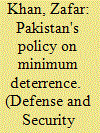

|
|
|
|
|
| Publication |
2013.
|
| Summary/Abstract |
This article focuses on Pakistan's policy option of "minimum deterrence" (MD) post-1998 nuclearization of South Asia and explores why "minimum" in reality is not the minimum. It states that the term "minimum" has not been fully defined yet due to which MD stays ambiguous. In addition, it endeavors to elaborate the rudimentary factors responsible for the non-existence of an MD, which, in turn, keeps the Pakistani stance on MD dynamic and evolving.
|
|
|
|
|
|
|
|
|
|
|
|
|
|
|
|